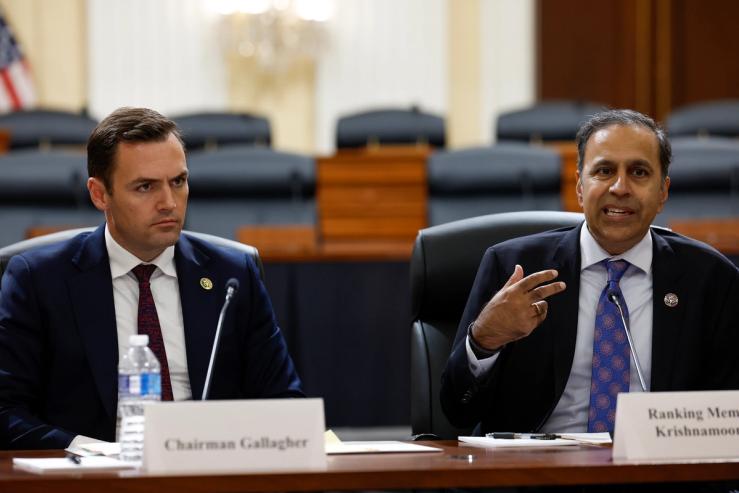The News
ByteDance would be forced to divest TikTok or otherwise face a ban on the popular video app in the U.S. under a new bipartisan bill being introduced in Congress on Tuesday.
Reps. Mike Gallagher, R-Wis. and Raja Krishnamoorthi, D-Ill., who lead the House select committee on China, are proposing legislation that would give ByteDance 180 days to divest TikTok, according to committee aides. If that doesn’t happen, web hosting services and app stores would be barred from distributing TikTok in the U.S.
The legislation represents a significant effort by members of Congress to address national security concerns associated with the Chinese ownership of the popular video app, which is used by more than 100 million Americans.
“This is my message to TikTok: break up with the Chinese Communist Party or lose access to your American users,” Gallagher said in a statement. “America’s foremost adversary has no business controlling a dominant media platform in the United States.”
A committee aide said that “the core motivating concern behind this piece of legislation is that applications that are controlled by foreign adversary entities including TikTok pose an unacceptable risk to U.S. national security.”
In response, a TikTok spokesperson equated the legislation to an “outright ban” and said it “will trample the First Amendment rights of 170 million Americans and deprive 5 million small businesses of a platform they rely on to grow and create jobs.”
In this article:
Know More
The legislation would also empower President Biden to designate certain social media apps as subject to control by a “foreign adversary” — specifically Russia, China, Iran, or North Korea — meaning they could also face forced divestment or a ban.
The legislation has a wide array of more than a dozen cosponsors, including Rep. Elise Stefanik, R-N.Y. — a member of House Republican leadership. The list includes conservatives such as Reps. Chip Roy, R-Texas and Kevin Hern, R-Okla and Democrats like Reps. Jake Auchincloss, D-Mass. and Ritchie Torres, D-N.Y.
Still, it’s unclear what its path will be in Congress, where past legislative efforts to restrict the app in the U.S. have stalled, despite a high-profile congressional hearing last March during which lawmakers grilled TikTok CEO Shou Zi Chew.
The House Committee on Energy and Commerce, which has jurisdiction over the issue, is expected to mark up the bill on Thursday.
The aide described the legislation as narrowly tailored and said the language was crafted to get around potential constitutional concerns. TikTok, which has pushed back on security concerns raised by U.S. officials, sued the state of Montana over its ban on the app, citing free speech violations and accusing it of being a bill of attainder, meaning legislation that allows the government to punish a person or group for a perceived crime without a trial. A federal judge blocked the law last November.
Step Back
Last month, Biden’s campaign joined TikTok in a bid to reach young voters, despite existing White House warnings about security risks. The app is currently banned from government devices.
TikTok has pushed back on security concerns raised by U.S. officials, holding up a $1.5 billion-effort known as Project Texas meant to wall off U.S. user data.
The View From China
A spokesman for the Chinese embassy in Washington D.C. urged the U.S. government to give ByteDance “fair, just and non-discriminatory treatment.”
TikTok’s parent company is “a private enterprise that conducts business in the U.S. in accordance with market principles and international rules and complies with US laws and regulations,” Liu Pengyu said in a statement to Semafor.
“At the same time, we are firmly against some people’s moves to deliberately overstretch the concept of national security to wear down Chinese enterprises,” Liu continued, adding that Beijing would “continue to firmly safeguard the legitimate rights and interests of Chinese enterprises.”
Notable
- The Wall Street Journal reported earlier this year that some American user data was still being shared with ByteDance employees.


